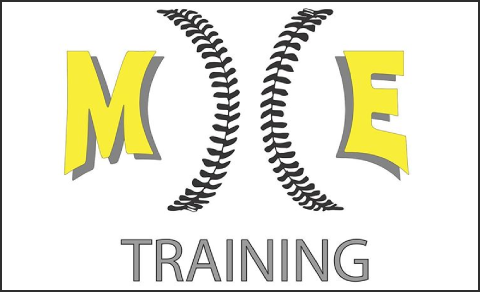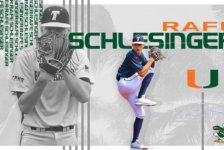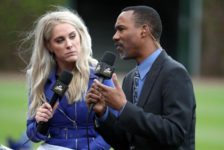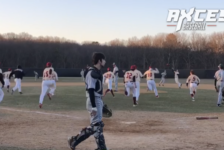The college recruiting process can be very overwhelming. To make matters more difficult, it’s constantly changing over the years. So if you played baseball and you think it’ll be easier for you to help navigate through your son’s process – think again, since the recruiting calendar and the entire landscape has likely completely changed since you went through it 25 years earlier.
To make it easier, I reached out to some dads that I know would have great insight and advice on the process.
They are: Brian Schlesinger, Christian Eiring, Eladio Exposito, Vito Friscia and Bob Johnson.
All of these gentlemen have sons that recently played Division-I baseball and they know exactly what the process entails. I asked a series of questions and here’s what they had to say…

At what point did you notice your son possessed a special talent?
Brian Schlesinger (son attends Miami): We always knew Rafe was going to be a good pitcher, he had the right tools – especially being a lefty. Somewhere around 15 years old everything started to take off for him.
Christian Eiring (son attends Stony Brook): I wasn’t a baseball guy growing up so I wasn’t as familiar with the game as other parents were and they kept telling me he was a special player at like maybe 7 years old. So the older he got, the more I noticed he played at a very high level.
Eladio Exposito (son plays pro ball for Atlanta Braves, attended Long Island University): From as early as his Little League days, I noticed that he possessed certain qualities. He’s always had the athletic actions, especially defensively, but he also was a late bloomer and always lacked size. It wasn’t until his junior year of HS that he hit his growth spurt. So I knew he’d always have to outwork everyone else. I also rarely praised or congratulated him when he performed well, instead I focused more on weaknesses in his game so that he would continue to strive to get better. And that is what created his relentless work ethic . Finally, when he got to his first year of college is when it all came together for him. It was at that time he started to receive raves and recognition from coaches and scouts. And that is when I started to realize he was indeed a special talent.
Vito Friscia (son plays pro ball for Philadelphia Phillies, attended Hofstra University): At age 14 he really separated himself from the other players.
Bob Johnson (sons play at Stony Brook and St. John’s): I don’t know that special talent is what I would say as much as at a very young age I saw their LOVE of the game of baseball.
Did your son(s) play other sports growing up? Did you try to encourage him to stick to baseball?
Brian Schlesinger: He played ice hockey, football and baseball. When we put him in baseball, he never looked back and never needed any encouragement.
Christian Eiring: Matt played basketball his whole life as well and I loved basketball so I never told him not to play it was more of a baseball is going to get you in college type of decision to stop after 11th grade to focus on baseball.
Eladio Exposito: I’ve always encouraged him to play multiple sports. When he was younger, he played baseball, basketball and football. He was always pretty good at all 3 sports, but he enjoyed baseball the most. I never had to encourage him to stick to baseball. Baseball was his true passion and that’s all he wanted to do. So by the time he got to middle school, he was done with football and basketball he played right up until he got to high school.
Vito Friscia: He played soccer and football as well. I thought being a well-rounded athlete was a good thing. But he did hit all year. He never put the bat away.
Bob Johnson: Both boys played multiple sports…I did not encourage them to stick to baseball or any sport or extracurricular activities for that matter. I believe my role was to support whatever they wanted to do as best as I could.
What events would you say were worth attending that you went to?
Brian Schlesinger: We weren’t huge showcase people, not that I discouraged it but it wasn’t us. The Perfect Game tournaments were where Rafe got noticed most – specifically Lake Point, Georgia.
Christian Eiring: Matt only did one showcase – the ECR event run by Pete Kritikos in which he performed very well and got a lot of interest from many Division-I schools.
Eladio Exposito: I started EJ attending events like Baseball Factory, PBR and PG at a very young age – I believe he had just started middle school. At that time he was young and undersized and it seemed sort of pointless from a recruiting standpoint. However, my main objective for attending those events at such an early age was for him to gain the experience. As a ballplayer, majority of your baseball career will consist of you attending some sort of event, whether it be a camp, showcase, combine, scout day, etc. At these events, you will be also time and clocked by radar whether it be running, throwing or swinging. So my belief was, the earlier he could be exposed to this atmosphere and learn the ins-and-outs on how to perform at these events, the more advanced at them he would be when it really counted. Therefore, I would say that every event we attend was well worth it.
Vito Friscia: Selectfest in New Jersey, the Power Showcase, Northeast Perfect Game Showcase and Area Code Games.
Bob Johnson: As far as recruiting purposes, camps, showcase are good. Tournaments were all helpful. There is something to be gained for each experience.
What would you say was the biggest waste of time or money during the travel ball years?
Brian Schlesinger: For me, personally I don’t feel any of it was a waste of time or money. It was crucial to his development, tremendous fun and memories we have forever.
Christian Eiring: I’d say the biggest waste of time and money would be for these kids or their parents paying for these camps which aren’t recruiting their kids and/or the kid doesn’t really have a shot to play for the school.
Eladio Exposito: I really can’t say anything was a waste of time or money. During the travel ball years, there were things that were great that we enjoyed and there were also things that weren’t so great. For us, whether it was great or not so great, it was more about the experience. We also tried to make the best out of any situation.
Vito Friscia: I don’t think it’s a waste of time or money if the kid has the talent. It’s a waste of time when parents put kids on teams that are over their heads and they pay tons of money to sit on the bench. You can not get exposure no matter wha team you are on if you’re on the bench. Play at your level, be a realist.
Bob Johnson: I truly believe for the players there is something to be gained in every experience, every event, every game for that matter, so that being said isn’t this what it’s all about?
Did any other teams make promises regarding your son’s future?
Brian Schlesinger: They did. When Rafe played for Tristate Arsenal, they made promises with college recruitment and did everything they said they would. At around 16 years old, we had a tough decision to move him to the Titans organization thinking it would be a better fit. They too did everything they said they would. Jim Clark lured us in with the Area Code invite and in turn, he also got invited to East Coast Pro as well as larger tournaments on a larger stage for Rafe.
Christian Eiring: Yes, travel baseball is business like anything else…every team wants the best talent so they will do what it takes to get you there. You do what you think is best for your son’s future.
Eladio Exposito: We never encountered any travel teams that made any promises regarding my son’s futurue. The travel teams he played for were usually focused on his potential and how they could help develop and improve on his skillset.
Vito Friscia: Of course they did. Coaches telling him that he could get drafted in the top-10 rounds and that he was being wasted where he was playing.
Bob Johnson: No there were never any promises made to my sons future by others.
Did you attend any college camps?
Brian Schlesinger: We did not attend college camps – we were supposed to but the college cancelled. Fortunately, Rafe committed at an early age and took that off the table.
Christian Eiring: No college camps
Eladio Exposito: Yes, we did attend a few college camps. I believe college camps are a good way to get yourself in front of college coaches. However, from a physical standpoint (size & strength), my opinion is you should only attend them when you are ready to make an impression.
Vito Friscia: College camps are good, but attend schools you are interested in. You will know if they are interested right away. If they don’t contact you or speak to you after the camp, forget it – they are not interested.
Bob Johnson: Yes we did attend college camps and I feel this is a very positive event to do, whether individually or with your team. It’s great for them to see you up close and for you to learn more about the school. Individually, you can target schools that you may be interested in or they have shown interest in you. If you team is going and there’s no interest on either side at that specific time time you still learn about the school, the program while also getting to perform/compete in that type of environment. As I mentioned previously, there’s something to b gained by all of it. Very beneficial.
Was location a factor?
Brian Schlesinger: Florida was always the target for Rafe, so yes, location was a factor.
Christian Eiring: For him, yes because he wanted to stay close to his family so that we could watch him play day-in and day-out. On top of that, it was an offer from Stony Brook that respectfully couldn’t be turned down.
Eladio Exposito: Staying close to home was not a priority for us. EJ actually was keen on going away for school. However, staying local really made it easy for him to workout with his personal trainers and utilize local facilities while he was in season. It was also great for my family and I to be able to attend majority of his games.
Vito Friscia: No it wasn’t a priority, but Hofstra played in a great conference and he could be close to home. Perfect fit for my son and for his family. Got to watch all his games.
Bob Johnson: I would not say it was a priority to stay close to home for either of my sons but Kyle, from a young age, wanted to be a Seawolf and play for Coach Senk at Stony Brook University. Coach Brown was very instrumental in Dylan’s choice to commit to St. John’s University. This is their journey, their dream coming to fruition but I am certainly very grateful and thankful that both boys ended up close and playing for excellent programs!
How big of a factor did academics play?
Brian Schlesinger: Academics was absolutely a factor; Miami is not an easy school to get into academically, so he had to raise his grades and be a bit more focused.
Christian Eiring: Academics are the most important piece to the puzzle. Matt is just as good of a student as he is ballplayer and that is just as special to me as any baseball accolade.
Vito Friscia: Academics was very important to us. We wanted our son to get a degree from a top academic school. Baseball was a bonus.
Bob Johnson: Academics definitely played a factor for us and had to be part of the equation for sure. It is so important to consider everything as they are developing not only as ballplayers but as young men. We are very blessed being at St. John’s and Stony Brook as both programs checked all the boxes for us.
Any advice to parents?
Brian Schlesinger: I get this question a lot and every single kid’s journey is going to be different. I encourage or welcome parents to reach out, I’ve had amazing people that proved to be helpful to me that have been in this position before. My best advice, try your best to put them around people that you know you can trust. Not just because this is an Axcess Baseball interview, Vinny’s coverage of Rafe from a young age and the time he has taken to answer questions from me personally has helped tremendously.
Vito Friscia: Stay patient, organized and don’t be afraid to ask questions – how long is he staying? Academic questions about tutoring, etc. How does he see your son and/or daughter contributing to the program (is he the guy, or bench player?). Try to cut it down to 3 schools, have two columns, good and bad points, then decide.
Bob Johnson: My advice to parents…enjoy the process no matter how it goes. The opportunity for your son or daughter to be able to play a sport they love at any level in college is such a gift! Be grateful you are in this place and do not put so much into D1, D2, D3, etc as you can flourish anywhere if your child will continue to work hard, continue to learn and grow on and off the field! Do your own homework as well, it’s a total team effort so don’t just sit back and wait for others to do it for you as well. Be realistic where the best fit is for you personally. Please do not compare your child to others, as I’ve said previously each person’s recruitment process is different. Some go much sooner than others, some go later. This only happens once in your child’s life, so stay positive troughout and enjoy the fruits of all the hard work, time and dedication our child has put in to be in this position in the first place!
Transferring is a big decision. How many people did you take advice from or did you keep it to a family decision?
Eladio Exposito: EJ experience with transferring schools was quite a bit of a wild ride. As you know, NYIT closed their athletic program and he was forced to find a new school after 13 games into the season. Fortunately for him, he was able to transition right over to LIU. Transferrin schools didn’t seem like a big decision because for him it wasn’t by choice. All in all, everything worked out and landed himself in a better situation. For us it was sort of a blessing in disguise. During that time, things were moving fast and decisions had to be made. We did seek advice from coaches, family and friends, but ultimately it was EJ’s decision where he wanted to go.












